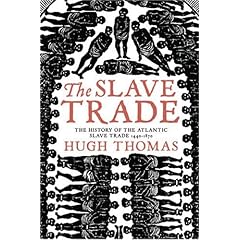 The Slave Trade avoids the sensationalism and moral outrage that have accompanied so many popular accounts. He achieves this by focusing on the development of the trade as a branch of European and, later, American commerce. He locates its origins in the ancient Mediterranean and medieval Islam, and then covers the beginning, growth and apogee (in the late 1700's) of the Atlantic trade. The emphasis is on the spread of the trade from the European perspective -- the international rivalries, the contacts with Africa and the colonization of the Americas.
The Slave Trade avoids the sensationalism and moral outrage that have accompanied so many popular accounts. He achieves this by focusing on the development of the trade as a branch of European and, later, American commerce. He locates its origins in the ancient Mediterranean and medieval Islam, and then covers the beginning, growth and apogee (in the late 1700's) of the Atlantic trade. The emphasis is on the spread of the trade from the European perspective -- the international rivalries, the contacts with Africa and the colonization of the Americas.Thomas then pauses to look at the trade as a business, with chapters devoted to the nautical details of ships, the kinds of people who were traders, the commodities brought to Africa and a thorough examination of the histories and locations of trading posts. He studies the means by which people were enslaved in Africa, and conducts a careful survey of the business practices of the trade on the coast, where European buyers met African sellers face to face. Only one chapter is devoted to the Middle Passage and the sale of slaves on the auction block, a sensitive but relatively bloodless account of the moral core of the trade. Throughout, Thomas treads carefully on touchy issues involving the role of African wars in generating slaves, the relationship between those wars and the demands of the slave traders, and the overall profitability of the trade to ship owners and captains.
The remainder of the book covers the continuation of the slave trade well into the 19th century and its final demise in an era when the last slaves crossed the Atlantic in steamships after having received smallpox vaccinations. This section is particularly devoted to the slow growth of the moral sentiments in popular religion that linked the abolitionist movement and evangelical Christianity, and is especially strong on showing the growth of abolitionist sentiment (or the lack of it) on the Continent, specifically in countries with overseas possessions.
_______________________________
This is an excerpt from NYT review from 1997. I have the book floating around somewhere. It is an exhaustive account of the slave trade from its early origins to its pirate days. Good reference material.
I have thebook also and use forreference. I never readthe whole thing....but I just happen to be reading SLAVE SHIP, which is very informative on theslavetrade, but concentrates on the transportation end. Its one of thosebooks which is hard to put down.
ReplyDeleteI have a sample of the Slave Ship and will probably buy it. Brutal stuff.
ReplyDelete